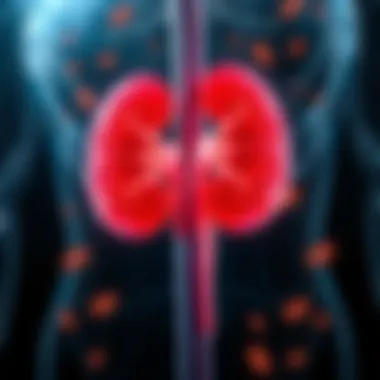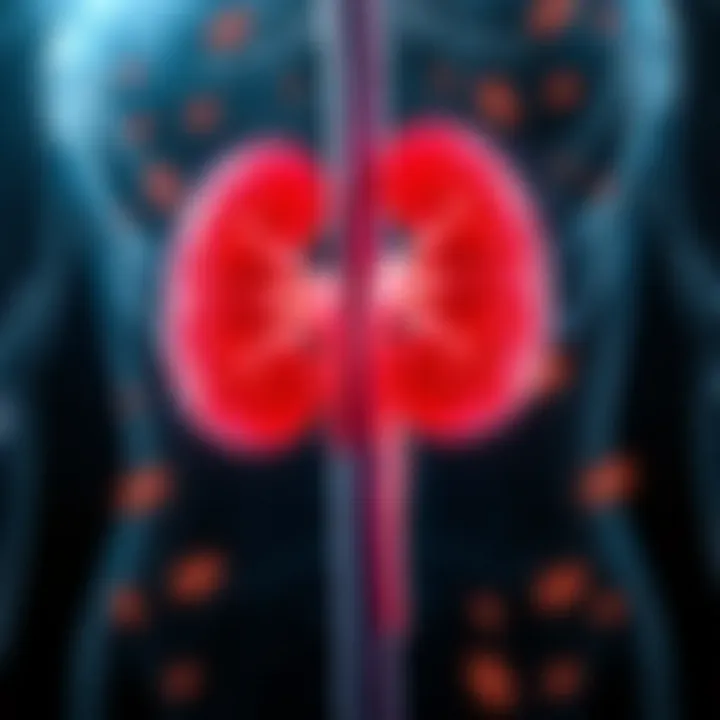Insights into Stage 3b Chronic Kidney Disease


Intro
Stage 3b Chronic Kidney Disease (CKD) marks a pivotal point in the progression of kidney dysfunction. This phase is characterized by a significant decline in kidney function, specifically where the glomerular filtration rate (GFR) ranges from 30 to 44 mL/min/1.73 m². Understanding this condition is crucial as it sets the stage for potential complications that can profoundly affect a person's health and quality of life. The advent of awareness surrounding CKD, especially in stage 3b, underscores its relevance not only to healthcare professionals but to the general public as well.
In our quest to grasp the intricacies of stage 3b CKD, we will delve into several aspects. These include identifying its characteristics, exploring risk factors, examining diagnostic criteria, discussing management strategies, and recognizing potential complications. Additionally, this article aims to promote a more comprehensive understanding of how stage 3b CKD can impact overall health and the day-to-day lifestyle of individuals.
It's important for us as a society to cultivate a sense of awareness around this condition, as early detection and management can halt or slow progression into further stages, which lead to more severe health issues. With that said, let's turn our attention to the methodologies employed in studying and managing CKD.
Prolusion to Chronic Kidney Disease
Chronic Kidney Disease (CKD) is a significant public health concern, impacting millions globally. In this article, we aim to shed light on the complexities of CKD, specifically focusing on stage 3b and its implications for patients. Understanding CKD is essential for healthcare providers, educators, and individuals affected by the disease. The deeper we delve into this condition, the greater our awareness of its characteristics, management, and the potential quality-of-life impacts for patients.
Defining CKD and Its Stages
Chronic Kidney Disease is defined based on the duration and functional impairment of the kidneys. There are several stages of CKD, ranging from stage 1—mild dysfunction—to stage 5, which indicates kidney failure requiring dialysis or transplantation. Understanding these stages helps clinicians predict disease progression and implement appropriate interventions early on. A firm grasp of CKD also aids in educating patients, allowing them to manage their health more effectively.
Benefits of Awareness
Knowledge surrounding CKD stages, particularly stage 3b, is crucial. Increased awareness can lead to early detection and timely management strategies, reducing the risk of complications like cardiovascular diseases and the eventual need for more invasive treatments. Patients can also become engaged in their care, better understanding dietary restrictions, medication compliance, and lifestyle adjustments needed to maintain kidney health.
Moreover, recognizing the psychological and social aspects of living with CKD fosters a supportive environment, enabling patients to navigate the challenges they face.
"Awareness about CKD is not simply about understanding the disease; it's about empowering patients to take charge of their health journey."
As we transition into the next section, it's important to establish a solid definition of CKD, ensuring that every reader has a clear foundation from which to explore the complexities of kidney health.
Stages of Chronic Kidney Disease
Chronic Kidney Disease (CKD) is a progressive condition that affects millions of individuals worldwide. Understanding the stages of CKD is paramount in not just diagnosing the disease but also in planning effective treatment strategies. Each stage signifies a decline in kidney function, allowing healthcare professionals to tailor interventions based on severity. Knowing where a patient stands in this continuum can guide decisions regarding medication, lifestyle changes, and necessary referrals to specialists. In particular, Stage 3b, characterized by a moderate to severe reduction in kidney function, calls for urgent attention due to its implications for both health and lifestyle.
Classification of CKD Stages
The classification of CKD stages serves as a framework upon which assessment and management rest. The stages, ranging from 1 to 5, are primarily determined by the Glomerular Filtration Rate (GFR).
- Stage 1: Normal or high GFR (90 mL/min or more) with other signs of kidney damage.
- Stage 2: Mild decrease in GFR (60-89 mL/min), again with indicators of kidney damage.
- Stage 3: Divided into 3a (GFR 45-59 mL/min) and 3b (GFR 30-44 mL/min), where kidney function is moderately to severely reduced.
- Stage 4: Severe reduction in GFR (15-29 mL/min), indicating the need for more proactive management.
- Stage 5: Kidney failure (GFR less than 15 mL/min), requiring dialysis or transplantation.
Assessing GFR not only classifies the stage but also facilitates appropriate actions like dietary adjustments, medication management, and monitoring for complications.
Significance of Stage 3b
Stage 3b holds critical significance within the chronic kidney disease continuum. At this juncture, patients may not exhibit obvious symptoms, yet the decline in kidney function ranges between 30-44 mL/min, creating a fertile ground for further complications, notably cardiovascular issues.
The implications of existing at this stage are profound:
- Increased Risk of Progression: Patients in Stage 3b are at a heightened risk for progression to Stage 4 or even Stage 5 kidney disease. Monitoring at this phase is essential.
- Comorbidities: Often, other medical conditions like diabetes or hypertension coexist and can exacerbate kidney deterioration.
- Psychosocial Impact: Living with CKD can take a toll on mental well-being. Patients may grapple with anxiety regarding their health, affecting their quality of life.
Consequently, healthcare providers focus on close monitoring, lifestyle modifications, and a multidisciplinary approach to care. Below is a brief summary of the key points regarding Stage 3b:
Stage 3b is not just a number; it signals a critical need for intervention and proactive management to stave off decline in kidney health.
Essentially, as Stage 3b patients navigate this challenging chapter, understanding and acting on this information becomes vital for preservation of health. The focus may shift toward collaboration among healthcare providers and building a supportive network around the patient.
Clinical Characteristics of Stage 3b CKD
The clinical characteristics of stage 3b chronic kidney disease (CKD) are pivotal as they not only reflect the current state of kidney function, but also guide both clinical decisions and patient management strategies. Understanding these characteristics can help healthcare providers tailor treatments to improve quality of life and potentially slow disease progression.
At this stage, the kidney function is significantly impaired, but patients might not yet experience severe symptoms. Therefore, it's crucial for both patients and healthcare professionals to grasp the implications of a glomerular filtration rate (GFR) in this stage, alongside key symptoms that could arise.
Glomerular Filtration Rate (GFR) Implications
The GFR is a vital indicator of kidney function and serves as a barometer for assessing the progression of CKD. For stage 3b CKD, the GFR typically ranges from 30 to 44 mL/min. This reduction in kidney function lays the groundwork for comprehensive management as it indicates a need for heightened surveillance and intervention.
- Importance of GFR in Management
The GFR measurement assists clinicians in monitoring disease progression and effectiveness of interventions. With a lowered GFR, there is an increased risk for complications such as anemia, mineral and bone disorder, and even cardiovascular problems. It becomes a priority for patients at this stage to have regular checks to keep track of kidney function, which allows healthcare providers to modify treatment plans as necessary. - Adjustments Based on GFR
When the GFR drops to this level, adjustments to medication dosages may become necessary. Many drugs are affected by kidney function, and ensuring patients are on appropriate doses can prevent toxicity and other adverse reactions. Furthermore, dietary restrictions may also need to be tailored based on specific lab results, considering potassium, phosphorus, and sodium levels.
"Managing CKD requires continual adjustments, and understanding GFR implications is key to reducing potential risks."
Common Symptoms Experienced


As one moves into stage 3b, patients may begin to experience a range of symptoms, although they can be quite varied and sometimes subtle. This variability can make it challenging for both patients and providers to discern CKD-related complications.
Some common symptoms that individuals with stage 3b CKD may encounter include:
- Fatigue: A persistent feeling of tiredness that is often exacerbated by anemia.
- Swelling: Frequent episodes of swelling in the feet and ankles due to fluid retention.
- Changes in Urination: Patients may notice increased frequency or urgency, or even alternative patterns such as decreased urination.
- Nausea and Appetite Changes: As waste products build up in the bloodstream, nausea can set in, along with changes in appetite leading to weight fluctuations.
Recognizing these symptoms early and discussing them with healthcare providers helps in crafting a proactive management plan. Knowledge of the potential challenges at this stage permits timely interventions that can boost the patient's health outcomes and quality of life.
In summary, being aware of the clinical characteristics associated with stage 3b CKD lays a foundation for understanding the broader implications of the disease. Both the GFR implications and common symptoms inform clinical practice and patient engagement strategies as they navigate this complicated phase of kidney health.
Causes and Risk Factors
Understanding the causes and risk factors associated with stage 3b chronic kidney disease (CKD) is essential for both prevention and management of this serious condition. Knowledge in this area can guide healthcare professionals in providing timely interventions and empower patients to make informed lifestyle choices that mitigate their risk. Recognizing the root causes of CKD not only aids in appropriate treatment but can also significantly impact a person's quality of life.
Common Etiologies of CKD
Several key factors contribute to the development of stage 3b CKD. These causes often intertwine, making it crucial to approach each patient's situation holistically. The following are among the most common etiological factors:
- Diabetes Mellitus: This condition is one of the leading causes of kidney damage. Prolonged high blood sugar levels can harm the kidneys’ filtering system, leading to gradual dysfunction.
- Hypertension: High blood pressure exerts additional strain on the blood vessels in the kidneys, which can impair their ability to function effectively over time.
- Glomerulonephritis: Various inflammatory diseases can affect the glomeruli, the filtering units in the kidneys. This inflammation can lead to kidney damage if not managed correctly.
- Polycystic Kidney Disease: This genetic disorder leads to the growth of numerous cysts in the kidneys, which can disrupt normal kidney function and lead to progressive deterioration.
- Obesity: Excess body fat can influence the risk of diabetes and hypertension, thereby putting individuals at higher risk for CKD.
- Chronic Urinary Tract Infections (UTIs): Recurrent infections can lead to kidney damage over time, particularly if the infections reach the kidney.
These causes underscore the need for early detection and management of risk factors associated with CKD. For instance, lifestyle modifications, such as a balanced diet and regular exercise, can help reduce these risks significantly.
Identifying High-Risk Populations
It is crucial to identify high-risk populations to develop effective prevention strategies for stage 3b CKD. Here are some groups that may be at a greater risk:
- Individuals with Family History of Kidney Disease: Genetics plays a significant role in kidney health. Those with a family history are often at a higher risk and should be counseled regularly.
- Diabetic Patients: As previously mentioned, uncontrolled diabetes is a chief contributor to kidney damage, making this group particularly vulnerable.
- Hypertensive Patients: Persistent high blood pressure affects blood flow in the kidneys. Regular monitoring and management are critical for these individuals.
- People Over Age 60: Age is a significant risk factor. With aging, kidney function naturally declines, and older adults may face a higher incidence of CKD.
- Minority Ethnic Groups: Some studies have shown that certain ethnic groups, such as African Americans and Hispanics, face a higher prevalence of CKD compared to their Caucasian counterparts.
- Obese Individuals: Extra weight puts individuals at a higher risk of developing diabetes and hypertension, further increasing the risk of kidney dysfunction.
Having a comprehensive understanding of the underlying causes and high-risk populations can serve as a vital tool for healthcare professionals when designing effective prevention and management strategies.
By identifying risk factors early and emphasizing the importance of routine check-ups, it becomes possible to catch CKD in earlier stages, potentially halting progression to more severe stages.
Diagnostic Criteria for Stage 3b CKD
Identifying stage 3b chronic kidney disease (CKD) accurately is pivotal as it sets the groundwork for managing the condition appropriately. Understanding the diagnostic criteria is crucial for both healthcare professionals and patients alike, ensuring timely interventions which may improve overall health outcomes. This stage reflects a moderate reduction in kidney function, specifically with a glomerular filtration rate (GFR) anywhere from 30 to 44 mL/min.
Monitoring kidney health allows for early detection of complications, as chronic conditions can slowly take a toll without immediate symptoms. Hence, early diagnosis through proper criteria can be the difference between merely managing symptoms and averting further damage to the kidneys.
Laboratory Tests and Results
To confirm a diagnosis of stage 3b CKD, healthcare providers often rely on a suite of laboratory tests. The GFR is calculated based on serum creatinine levels, age, race, and sex, which creates awareness around the kidney's filtering ability. In practical terms, that means a standardized equation may be used to estimate how well your kidneys are doing their job.
Another key test involves measuring serum electrolytes, including potassium and calcium, alongside testing for certain proteins in the urine. High levels of protein can indicate further kidney dysfunction, underscoring the importance of these tests in assessing overall kidney health.
Additionally, some common laboratory tests include:
- Complete Blood Count (CBC): Provides insights into anemia that might develop due to CKD.
- Urine Albumin-to-Creatinine Ratio (UACR): Helps determine how much albumin is present in urine, which is a crucial indicator of kidney health.
- BUN and Creatinine Levels: These markers help gauge how effectively your kidneys are filtering waste products.
Ultimately, laboratory results serve as critical pieces in the puzzle of diagnosing and managing stage 3b CKD, providing a detailed picture of kidney functionality and guiding follow-up actions.
Imaging Studies and Their Role
While blood and urine tests offer substantial insight into kidney function, imaging studies further bolster the diagnostic process for stage 3b CKD. Techniques such as ultrasound or CT scans can visualize renal structure and blood flow, helping providers identify any anatomical anomalies or obstructions that may contribute to kidney damage.
Imaging studies often reveal issues that blood tests cannot, such as the presence of kidney stones or cysts that may be impeding function. Notably, these evaluations not only enhance diagnosis but also inform potential treatment plans.
- Ultrasound: A non-invasive method that uses sound waves to produce images of the kidneys, helping to assess size, structure, and any abnormalities.
- CT scans: Offering detailed cross-sectional images, which could highlight issues in greater depth than ultrasound.
In summary, imaging studies play an invaluable role in diagnosing stage 3b CKD, offering insights that guide therapeutic decisions. By integrating lab results with imaging, healthcare professionals can craft a well-rounded understanding, leading to tailored treatment strategies.
Management Strategies
Managing stage 3b chronic kidney disease (CKD) is vital for slowing progression and maintaining the quality of life for affected individuals. This stage of CKD represents moderate kidney dysfunction, requiring comprehensive management strategies that encompass both lifestyle changes and pharmacological interventions. The right approach not only helps in preserving kidney function but also minimizes the risks of complications and comorbidities that come with CKD.
Lifestyle Modifications
Lifestyle plays a crucial role in managing stage 3b CKD. Patients can make some beneficial changes that greatly impact their health outcomes. Here are some key lifestyle modifications to consider:
- Dietary Adjustments: It’s critical to consult with a dietitian familiar with kidney health. Reducing sodium intake helps manage blood pressure, while lowering protein can ease the kidneys’ workload. Incorporating more fruits and vegetables, limiting processed foods, and being cautious with potassium and phosphorus are wise steps.
- Hydration Management: While staying hydrated is generally advisable, those with CKD need to balance fluid intake as per their personal needs. Too much fluid can lead to swelling and high blood pressure, which are undesirable.
- Regular Physical Activity: Engaging in regular, moderate exercise helps in maintaining a healthy weight and controlling blood pressure. This could be as simple as walking for 30 minutes most days, but should always be tailored to the individual’s ability and preferences.
- Quit Smoking and Limit Alcohol: Both smoking and excessive alcohol consumption can exacerbate kidney damage. Quitting smoking can also greatly improve overall health, and moderation in alcohol can help avoid unnecessary strain on the kidneys.
- Stress Management: Chronic kidneys disease doesn’t just affect the body; it can also be mentally taxing. Techniques such as mindfulness, yoga, or even simple hobbies can create a positive impact on mental wellbeing.


"The goal of lifestyle changes isn't to follow strict rules but to create habits that promote long-lasting health and wellness."
Pharmacological Interventions
In some instances, lifestyle changes alone might not cut it. Pharmacological interventions are equally significant in the management of stage 3b CKD. Prescribing the right medications is vital to prevent further kidney damage. Key points to consider:
- Blood Pressure Control: Angiotensin-converting enzyme (ACE) inhibitors or angiotensin II receptor blockers (ARBs) are often prescribed. They help in controlling hypertension and have protective benefits over kidney function.
- Managing Diabetes: For patients with diabetes, utilizing medications that help control blood sugar levels is critical, as diabetes can be a contributing factor to kidney decline. Medications such as Metformin or newer agents like GLP-1 receptor agonists might be recommended.
- Addressing Anemia: Many individuals in stage 3b CKD experience anemia due to lowered erythropoietin levels. Iron supplements or erythropoiesis-stimulating agents might be necessary depending on hemoglobin levels and iron status.
- Phosphate Binders: As kidney function declines, phosphate levels can rise in the body. Using phosphate binders can help minimize hyperphosphatemia and its associated risks.
- Vitamin D Supplements: Since CKD can affect vitamin D metabolism, supplementation might be recommended to help maintain bone health and reduce cardiovascular risks.
Implementing these pharmacological strategies should always involve a thorough discussion between the healthcare provider and the patient to tailor the treatment plan effectively, taking individual health conditions into account.
In sum, a well-rounded management strategy for stage 3b CKD incorporates both lifestyle modifications and appropriate medications. In doing so, patients can aim to improve their quality of life and delay further progression of the disease. For more detailed information, patients can reference resources such as Kidney.org and consult their healthcare providers.
Monitoring and Follow-Up
Monitoring and follow-up are vital components in the management of stage 3b chronic kidney disease (CKD). At this stage, kidney function is significantly impaired, and the need for regular assessments becomes paramount. The primary goal is to track the progression of the disease and adjust management strategies before the condition worsens. Without diligent monitoring, early signs of complications may fly under the radar, leading to more severe health issues down the line.
Regular Check-Ups and Assessments
Regular check-ups and assessments provide a structured way for healthcare professionals to evaluate the patient's condition. These appointments generally include blood tests, urine tests, and measurements of blood pressure. Specifically, monitoring glomerular filtration rate (GFR) is crucial as it indicates how well the kidneys filter waste from the blood. Regular tests help in identifying any decline in kidney function, which can influence treatment plans.
Furthermore, consistent health assessments allow practitioners to screen for associated conditions that commonly arise in CKD, such as hypertension and diabetes. Catching these issues early can significantly improve the overall health outlook for the patient. As the saying goes, "an ounce of prevention is worth a pound of cure."
Another vital aspect of these check-ups is the evaluation of the patient’s symptoms. Stage 3b CKD can bring along a range of complaints such as fatigue, swelling, or persistent itching. Keeping a close eye on these symptoms can aid in tailoring individual treatment plans effectively.
Adjustments to Treatment Plans
Considering the dynamic nature of stage 3b CKD, treatment plans should not be set in stone. What works for one individual may need tweaking for another. With monitoring, adjustments are made based on several factors, including changes in laboratory test results, patient symptoms, and overall health status.
For instance, if a patient's blood pressure is rising unpredictably, the healthcare provider may increase antihypertensive medications, change dosage, or even try different classes entirely. Additionally, if laboratory results indicate worsening kidney function, dietary modifications or more aggressive fluid management may be introduced.
In light of the psychological toll that CKD can take, discussions during follow-ups also serve as an opportunity for healthcare providers to assess the mental and emotional wellbeing of their patients. It can be a chance to explore stress management techniques and encourage patients to engage their support networks. As we navigate the ever-evolving landscape of CKD management, having an adaptable approach can make all the difference.
"The journey through chronic kidney disease requires diligence, but with the right monitoring and follow-up, patients can navigate this path more confidently."
The need for consistent engagement with healthcare professionals helps foster empowerment and patient involvement in their own care, enhancing the effectiveness of management strategies. This collaborative approach paves the way for improved health outcomes and a better quality of life.
Potential Complications
As we examine the journey through Stage 3b chronic kidney disease (CKD), recognizing potential complications becomes essential for both patients and healthcare providers. Understanding these complications can not only help manage the condition effectively but also reduce the risk of further decline in kidney function and overall health.
Stage 3b CKD is marked by a moderate reduction in the kidneys' filtering capacity, specifically a glomerular filtration rate (GFR) between 30 to 44 mL/min. This state is crucial, as it signifies a tipping point where complications can arise, exacerbating the patient's health status. Today, we will explore two vital complications related to this stage: the progression to end-stage kidney disease and the cardiovascular risks associated with CKD.
Progression to End-Stage Kidney Disease
The risk of progressing from Stage 3b to end-stage kidney disease (ESKD) is a significant concern. Patients in this phase must remain vigilant in monitoring their kidney function. According to studies, nearly 15% of patients with Stage 3b CKD may progress to ESKD within five years. Several factors can influence this progression, including:
- Diabetes and Hypertension: Both are leading causes of CKD. Managing these underlying conditions effectively is paramount.
- Proteinuria: The presence of excess protein in urine is a marker of kidney damage. The more severe the proteinuria, the greater the risk of decline in kidney function.
- Age: As individuals age, the natural wear and tear on the kidneys can hasten disease progression.
Regular follow-ups and tests, such as GFR assessments, can help identify early signs of deterioration. Furthermore, lifestyle modifications and adherence to treatment plans are critical in preventing or delaying the transition to ESKD.
"At this stage, vigilance from both the patient and the medical team can make all the difference."
Cardiovascular Risks Associated
Patients with Stage 3b CKD are not just fighting against declining kidney health; they must also confront an increased risk of cardiovascular diseases. There is a well-established link between CKD and cardiovascular events, including heart failure and heart attacks. Here are some critical considerations regarding this connection:
- Inflammation and Oxidative Stress: CKD is often accompanied by chronic inflammation and oxidative stress, which can lead to vascular damage. This dual threat can accelerate atherosclerosis, raising the risk of cardiovascular events.
- Fluid Overload: Impaired kidney function can result in fluid retention, leading to increased blood pressure and cardiac workload. This situation can further strain the heart, particularly in patients with existing cardiovascular conditions.
- Abnormal Lipid Profiles: Many individuals with CKD exhibit dyslipidemia, or abnormal lipid levels, which significantly contributes to cardiovascular risks.
To manage these risks, healthcare providers often recommend a comprehensive approach, combining medications like statins to address cholesterol levels with lifestyle interventions. Regular cardiovascular screenings are also vital to monitor and mitigate these risks effectively.
In summary, recognizing these potential complications in Stage 3b CKD is critical for preventing severe health issues. Ensuring patients are educated about these risks, along with proactive monitoring and management strategies, can lead to better outcomes and enhanced quality of life.
The Psychological Impact of CKD
The psychological burden of chronic kidney disease (CKD), particularly in its stage 3b, presents significant challenges for patients. Understanding this impact goes beyond the biological and medical facets, drawing attention to emotional well-being. Individuals contending with CKD often experience a rollercoaster of emotions. The prospect of progressive illness can breed feelings of uncertainty, fear, and sadness. These emotional responses can complicate disease management, impacting patient outcomes. Hiking up the awareness of mental health considerations is crucial not only for effective treatment but also for enhancing patients’ quality of life.
Mental Health Considerations


Patients in stage 3b CKD frequently navigate a complex landscape of mental health issues. Anxiety and depression are commonly reported conditions, arising from the burden of their diagnosis. The chronic nature of CKD often leaves individuals grappling with the reality of dialysis or transplant waiting lists, along with changes to lifestyle and routine.
"Mental health is as critical to recovery as physical health; yet, it often remains in the shadows of patient care."
A variety of factors contribute to the increased risk of mental health issues among CKD patients:
- Chronic Pain: Persistent discomfort can overshadow daily living, heightening frustration.
- Financial Stress: The cost of managing CKD can lead to anxiety over job security and health expenses.
- Social Isolation: Changing health status can pull individuals away from activities and relationships.
These factors can create a vicious cycle. Psychological distress may lead to poorer adherence to medical regimens, which in turn exacerbates the disease.
Social Support and Its Importance
The role of social support in managing stage 3b CKD can’t be overstated. A robust support system—friends, family, and healthcare providers—can pave the way for better coping mechanisms. Studies have shown that patients with strong social connections often enjoy better health outcomes.
Social support manifests in various forms:
- Emotional Support: Simply having someone who listens can lower feelings of stress and anxiety.
- Informational Support: Family or knowledgeable friends can help patients navigate the complex world of treatment options and lifestyle changes.
- Instrumental Support: This includes practical help, like accompanying patients to medical appointments, which can reduce the burden of care.
Finding the right balance involves fostering these social networks and encouraging open communication about the challenges faced. Educating families about CKD can also empower them to offer more effective support. Organizations and support groups can congregate individuals experiencing similar struggles, making the journey a shared experience.
Integrating Care in Stage 3b CKD
In stage 3b chronic kidney disease (CKD), the task of integrating care from various healthcare providers becomes increasingly essential. Patients at this level of CKD experience significant changes in their kidney function, which invariably affects their overall health and quality of life. Therefore, a collaborative approach to patient management is critical for identifying complications early, optimizing treatment responses, and enhancing patient education. Integrating care not only streamlines processes but also lays the groundwork for a more comprehensive understanding of the patient's journey.
Collaboration Among Healthcare Providers
Collaboration among healthcare professionals is one of the cornerstones of effective management in stage 3b CKD. In this phase, care is often a team effort that includes nephrologists, primary care physicians, dietitians, and social workers. Each provider brings specialized knowledge to the table, and when they work in unison, the patient reaps the benefits.
- Holistic Approach: A multidisciplinary team ensures that all aspects of a patient’s health are investigated and addressed. For instance, while the nephrologist monitors kidney function, the primary care doctor manages chronic conditions like diabetes or hypertension that are commonly associated with CKD.
- Shared Decision-Making: With various specialists involved, decision-making becomes a shared responsibility. This can enhance the personalization of care, leading to tailored treatment plans reflecting the patient's unique circumstances and preferences.
- Communication Pathways: Effective communication among providers helps in tracking a patient’s health trajectory more accurately. Regular meetings, electronic health records, and shared platforms make it easier to exchange vital information quickly, thus enabling timely intervention.
The combined efforts of healthcare providers create a safety net, often catching issues before they escalate.
Ultimately, fostering an environment where healthcare professionals collaborate defines the stage 3b CKD management process.
Patient Education and Empowerment
Another pivotal aspect of integrating care is empowering patients through education. Patients often feel adrift once diagnosed with CKD, with many questions about their condition and treatment options. Education serves as the beacon guiding them through this challenging phase.
- Understanding the Condition: Patients should be encouraged to learn about stage 3b CKD. When individuals comprehend what CKD means, the associated risks and the importance of adhering to treatment plans, they become more engaged participants in their health journey.
- Skill Development: Self-management skills are particularly vital in chronic illness. Diet modifications, medication adherence, and routine health monitoring can significantly impact the disease's progression. For instance, recognizing early symptoms of potential complications can lead to prompt medical attention, ultimately improving outcomes.
- Support Networks: Engaging support groups can also empower patients by providing a platform for shared experiences and learning from others who are navigating similar challenges. This not only fosters emotional support but also reinforces knowledge sharing on effective coping mechanisms.
In summary, integrating care in stage 3b CKD emphasizes a shared approach among healthcare providers while fostering patient empowerment through education. Together, these elements create a robust system conducive to better health outcomes and enhanced quality of life for individuals battling this chronic condition.
Research Perspectives and Future Directions
Research in chronic kidney disease (CKD) has taken significant strides in recent years. Stage 3b, being pivotal in the progression of kidney dysfunction, presents both challenges and opportunities for ongoing and future studies. Understanding the nuances of this stage is key to managing patient outcomes effectively. Researchers are now focusing on comprehensive approaches that incorporate clinical management, patient-reported outcomes, and advancing technologies to transform how CKD, particularly stage 3b, is understood and treated.
Current Research Trends in CKD
The landscape of CKD research is evolving, with several trends emerging that promise to refine our understanding of the condition.
- Genetic Insights: There is a growing interest in the genetic factors that contribute to CKD. Researchers are exploring how variations in genes can influence the risk of developing kidney disease, providing a possible target for preventive measures.
- Lifestyle Modification: Current studies emphasize the critical role of lifestyle changes in managing CKD. Diet, exercise, and weight management are under the microscope, with emerging evidence suggesting that tailored lifestyle interventions can slow down the progression of kidney disease in stage 3b patients.
- Longitudinal Studies: There is a shift towards long-term studies that track the progression of CKD over decades. These research efforts aim to gather real-world data, providing insights into how stage 3b develops and what factors influence its trajectory.
- Biomarkers: Researchers are actively looking for reliable biomarkers to predict the progression of kidney disease. Identifying biomarkers could lead to earlier interventions and more personalized treatment plans for patients with stage 3b CKD.
"The focus on biomarkers may redefine how we assess kidney function, potentially moving beyond traditional measures like GFR alone."
Emerging Therapies and Technologies
As our understanding of CKD deepens, so does the innovation in therapeutic approaches and technologies aimed at improving patient care.
- Regenerative Medicine: One promising avenue involves stem cell research aimed at regenerating kidney tissue. This field is in its infancy but holds the potential to restore kidney function in patients who have lost substantial nephron mass.
- Gene Therapy: Early-stage clinical trials are exploring gene therapies that target the underlying genetic mechanisms of CKD. It’s a bold frontier, with the potential to dramatically shift the treatment paradigm.
- Wearable Technology: Advances in wearable devices can now monitor kidney function in real-time. These devices can track vital signs, fluid intake, and even biochemical markers, offering a continuous view of a patient’s health, which is invaluable for those with stage 3b CKD.
- Telemedicine: The rise of telehealth services has changed the face of patient care in CKD. Remote consultations enable patients to receive expert advice from specialists, ensuring that they adhere to treatment regimens without the burden of frequent in-person visits.
With a wealth of research being conducted in these areas, the future looks increasingly optimistic for individuals facing stage 3b chronic kidney disease. Gaining insights from this ongoing research will be essential in developing effective management strategies tailored to the unique needs of each patient.
Ending
In wrapping up the discussion surrounding stage 3b chronic kidney disease (CKD), it is essential to highlight the broader implications of this condition for individuals and the healthcare system. Stage 3b marks a significant turning point in kidney function, where the glomerular filtration rate (GFR) ranges between 30 to 44 mL/min. This level of impairment is not just a statistic; it profoundly impacts patients' daily lives, emphasizing the need for vigilant clinical management and patient education.
Summary of Key Takeaways
- Stage 3b CKD indicates moderate to severe chronic kidney disease with a GFR decreasing.
- Key symptoms often include fatigue, swelling, and changes in urination patterns.
- Awareness of risk factors, such as diabetes and hypertension, is crucial in prevention and management.
- Regular monitoring and lifestyle adjustments can help manage progression and complicatons.
By immersing ourselves in the details of stage 3b CKD, we can identify critical management strategies that can alleviate symptoms and perhaps delay the progression to more severe stages of kidney disease. It’s not just about treatment; it’s about optimizing quality of life and maintaining functionality. This understanding paves the way for patients, families, and healthcare professionals to approach stage 3b CKD with knowledge and confidence.
The Importance of Ongoing Research and Awareness
The medical community must continue to invest in research centered around stage 3b CKD. Developing innovative treatment options and understanding the complexities of kidney disease can create a ripple effect, enhancing patient outcomes significantly.
Moreover, increasing public awareness about kidney health can empower more individuals to adopt preventive measures, such as modifying lifestyle habits and adhering to regular check-ups. This proactive stance rather than a reactive one has the power to directly impact kidney health on a larger scale.



